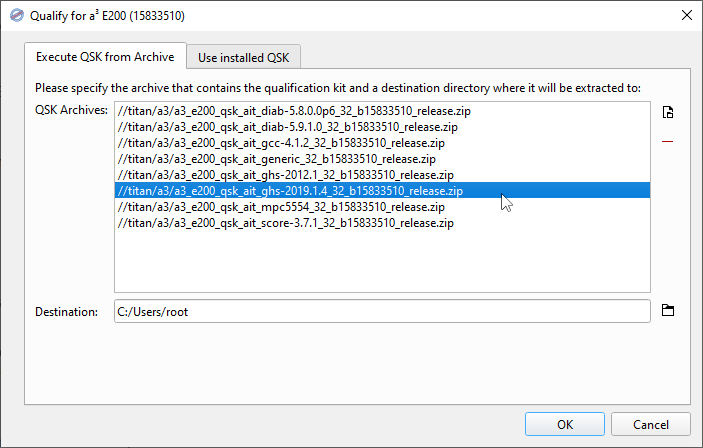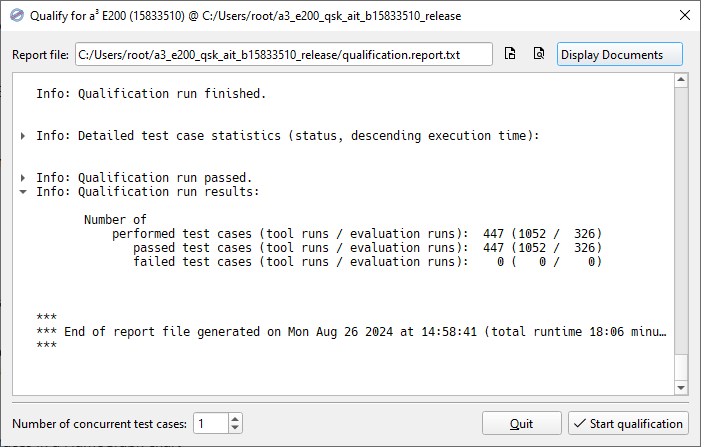Your usage of aiT can be qualified according to ISO 26262, DO-178B/C, DO-330, IEC-61508, EN-50128, EN-50657, EN-60601-1, and other safety standards. We offer special Qualification Support Kits (QSKs) that help you simplify and automate your qualification process.


Each QSK consists of the following parts:
- Specification of the tool functional requirements
- Test cases and test procedures
- Requirements trace data (traceability matrix)
- Test suite and execution framework
- Tool lifecycle data
Tool functional requirements (TOR)
This part defines the tool functions and technical features which are stated as requirements to the tool behavior under normal operating conditions, and specifies the operational context and conditions in which the tool computes valid results, i.e. restrictions such as not supported hardware options or specific code constructs.
Test cases and procedures (TOVVCP)
The test cases demonstrate the correct functioning of all specified functional requirements. Test case definitions include the overall test setup and a detailed structural and functional description of each test case, i.e. how it works and what the expected result is.
Trace data (traceability matrix)
Each functional requirement and each test case is assigned a unique identifier, enabling a mapping to be realized over the so-called traceability matrix.
Test suite and execution framework
The test suite contains implementations of the test cases specified in the TOVVCP that are designed to show that the requirements described in the TOR are satisfied.
Each test case consists of one or several tool test runs and optionally, evaluation test runs. The output of test case execution constitutes the tool verification results. If all test cases pass, compliance with the TOR has been demonstrated.
Tool lifecycle data (QSLCD)
In addition to demonstrating that the tool operates correctly in the operation context of its user, safety standards often require evidence that the tool development process fulfills certain demands, e.g. with respect to quality assurance, traceability, requirement engineering and verification activities.
These topics are covered by documents which detail the tool development processes at AbsInt:
- Software Development Plan
- Software Configuration Management Plan
- Software Quality Assurance Plan
- Software Quality Assurance Records
- Software Verification Plan
- Software Verification Results
- Compliance Certificate
Easy to use
Each QSK is delivered as a single ZIP archive that doesn’t need to be unpacked. You can run one or several QSKs directly from within aiT, both in GUI and batch mode. All tests are carried out fully automatically, and the results are then displayed and/or saved to a report file specified by you. The qualification results can be printed and attached to your certification documents.
Custom test cases
All QSKs can also be extended with your own test cases to cover your operational environment.
Generic and compiler-specific QSKs
The base version of a QSK performs checks on test cases created with a “generic” C compiler, e.g. some reasonably common version of GCC. Typically, this is sufficient for certification.
Your certification authority or your own guidelines may also dictate that the qualification be carried out on test cases compiled with the exact same version of the exact same compiler that you use. For that, a number of compiler-specific QSKs exist — optional add-ons to the base QSKs that offer supplemental test cases compiled with the compiler in question. These provide additional confidence that aiT correctly handles code patterns specific to that compiler, e.g. when automatically resolving calls or determining loop iteration counts.
Availability
Most QSKs are developed on customer request. The development time depends on the complexity of the architecture in question, the availability of the specific compiler version requested, and on our workload at the time. Please contact us with any questions.
The following QSKs have already been developed and are available at a moment’s notice, for the latest version of aiT as well as for any older stable release indicated:
| Base QSK (generic) | Add-on QSKs (compiler-specific) | aiT version | ||||||||||||
|---|---|---|---|---|---|---|---|---|---|---|---|---|---|---|
| ARM |
|
|||||||||||||
| C16x |
|
|||||||||||||
| C28x |
|
|||||||||||||
| i386 | ✗ | 9.08–current | ||||||||||||
| LEON3 | GCC 3.4.4 | 10.08–current | ||||||||||||
| M68020 | GCC 4.2.1 | 9.08–current | ||||||||||||
| MPC5xx |
|
|||||||||||||
| e200 |
|
|||||||||||||
| e300 |
|
|||||||||||||
| MPC755 | DiabData 4.4 | 9.04–current | ||||||||||||
| IBM PPC750 | DiabData 4.4 | 10.04–current | ||||||||||||
| TriCore |
|
|||||||||||||